| |
|
Saturday, May 17 Tifereth Israel Synagogue—Dizengoff Night


Sunday, May 18 Community Israel Independence Celebration

Wednesday, May 28 JFS~Ellen Saks lecture on mental illness


Tuesday, June 3 Guardians Golf & Tennis Tournament


Friday-Saturday, June 6-7 JFS~Judaism on the Wild Side

Sunday, June 8 Temple Solel~Tikkun Leil Shavuot


THE VIEW FROM JINSA
Israel at 60 continues to bend over backwards to accommodate neighbors
By Shoshana Bryen
 WASHINGTON, D.C.—Israel's political independence in 1948 coincided with the arrival of the remnants of Europe's Jewish population coupled with hundreds of thousands of impoverished Jews of the Middle East - tossed empty-handed from their centuries-old homes. They, and the chalutzim who had been there for the preceding 75 years, built on the presence of Jewish communities that never left after the Second Jewish Commonwealth - and they were successors to the Biblical generations rooted in the Holy Land. Seen in such a light, 60 years isn't very long. WASHINGTON, D.C.—Israel's political independence in 1948 coincided with the arrival of the remnants of Europe's Jewish population coupled with hundreds of thousands of impoverished Jews of the Middle East - tossed empty-handed from their centuries-old homes. They, and the chalutzim who had been there for the preceding 75 years, built on the presence of Jewish communities that never left after the Second Jewish Commonwealth - and they were successors to the Biblical generations rooted in the Holy Land. Seen in such a light, 60 years isn't very long.
But in those 60 years, modern Israel has built a multi-cultural, multi-religious, multi-ethnic Jewish democracy with a UN "Top 20" economy, world-class high-tech and medical innovation, as well as arts, literature and a frequent playoff berth in European basketball. There is no shortage of political opinions, political parties or political literature - and no one goes to jail for them. Israel has military and intelligence services that protect the people and share tactics, technology and secrets with its friends.
No long-term refugee camps; no UNRWA; no suicide bombing and no veneration of bombers; no inter-generational refugees; no demonization even of those who still seek to kill Jews and destroy Israel. The opposite - we are constantly amazed, and frustrated, by the lengths to which Israel will go to send food and fuel into Gaza, provide medical passes to Gazans for treatment in Israel (even after they found the ones with bombs they planned to detonate in the hospitals), and hold out the possibility of Palestinian independence as Hamas announces plans for the military destruction of Israel and Fatah demands that Israel stop being a Jewish state. We are constantly amazed, and frustrated, by the amount of time, technology and ingenuity Israel spends figuring out how to minimize collateral damage to the civilians with which Hamas and Hezbollah surround themselves as they fire at Israeli civilians.
Israel is the destination of choice for Darfur refugees who have heard that if they walk through the desert and reach Israel they will be safe - and they are.
It is not perfect; not even close. But modern Israel is an extraordinary political, social and military accomplishment and we take our hats off to Israelis of all stripes, styles, colors, political persuasions and religions.
So how does such a country come to rank second in European opinion (after Iran) as the greatest threat to world peace? How in living memory (growing less frequent every day) of the death camps and in an obvious, disgusting and verifiable lie, can Israel be accused of building Auschwitz in Gaza and committing genocide against Arabs whose population in Israel proper (where they are citizens with representation in the Parliament) and in the territories continues to grow rapidly?
We have a theory in two parts: the Arab part and the European part; they are related. Subsequent columns will examine them.


FROM THE GATES OF THE NEGEV
Austria's president tells Israeli delegation of his sympathy for Sha'ar Hanegev residents
By Ulla Hadar
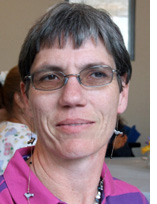 KIBBUTZ RUHAMA, Israel—A small delegation has returned to the Sha’ar Hanegev community of settlements after meeting in April with Austria’s President Heinz Fischer. KIBBUTZ RUHAMA, Israel—A small delegation has returned to the Sha’ar Hanegev community of settlements after meeting in April with Austria’s President Heinz Fischer.
The delegates participating were mothers and daughters from neighboring Kibbutz Nir Am, Kibbutz Kfar Aza and Kibbutz Nahal Oz, as well as children from the Hof Ashkelon Municipality, Eshkol Municipality and two girls from the city of Sderot.
Members of the Jewish community in Vienna read in the newspaper a letter
written by Michal Simchi from Kibbutz Nir Am. The letter expressed her
feelings and described the difficulties connected with living in an area under constantly rocket attacks.
The Austrian B’nai Brith organization in cooperation with the Vienna Jewish Congregation and the Israeli Embassy decided to invite a delegation from theNegev area of Israel for a visit to Austria.
The delegation toured Austria for seven days, with the highlight being a visit to the palace of the Austrian president and the personal encounter with the president himself.
 Keren Doron Katz from Kibbutz Nahal Oz, who travelled with her 10 year old daughter Tom, said it is important to explain to people what is happening in the area neighboring Gaza. Keren Doron Katz from Kibbutz Nahal Oz, who travelled with her 10 year old daughter Tom, said it is important to explain to people what is happening in the area neighboring Gaza.
The children presented an artwork to President Fischer that they themselves had created. They explained their feelings when a "Red alert" signal is activated and how it affects them to live in the shadow of Kassam rocket attacks and terror acts from Gaza.
Fischer, who himself grow up in the shadow of the
{Orly Yassu photo}
Second World War, was surprised to learn that the children have to hide underneath tables during rocket attacks and told them that no child of today should have to go through such an experience.
“I will work for the purpose of peace so that you don’t need to hide underneath tables,” he said.
He also told the delegation about his days as a volunteer 45 years ago in a kibbutz in Northern Israel and even remembered small sentences and words in Hebrew.
The president promised to help out in the process towards reaching peace in the conflict with the Gaza strip.

Nancy Harrison
cruise & tour specialist
(619) 265-0808


THE JEWISH CITIZEN
Hebrew Day takes virtual tour of Israel
By Donald H. Harrison
 SAN DIEGO—To mark Israeli Independence day (Yom Ha'atzma'ut) and to provide grandparents and grandchildren with an experience they could share, Soille San Diego Hebrew Day School sponsored a virtual tour of Israel on Thursday, May 8, that whirled family members through an itinerary that would be formidable even for a United Jewish Federation mission. SAN DIEGO—To mark Israeli Independence day (Yom Ha'atzma'ut) and to provide grandparents and grandchildren with an experience they could share, Soille San Diego Hebrew Day School sponsored a virtual tour of Israel on Thursday, May 8, that whirled family members through an itinerary that would be formidable even for a United Jewish Federation mission.
With their grandparents in tow, children in kindergarten through fifth grade moved from station to station around the Orthodox day school imagining—with the help of some inventive props—just what it would be like to take a trip to the land that they read or hear about almost every school day.
So, after the children received their passports, they went on an El Al flight that was as quick as it took Scotty to beam up Captain Kirk. Next, they went through Israeli Customs where their passports were stamped and they received Israeli flags in welcome.
 
Once in Israel, the students were whisked to Jerusalem where, after a suitable hand wash and an opportunity to say prayers before eating, they went to the Kotel, where they were given a bagel with labane (a yogurt concoction) spiced with zatar as well as materials to write a prayer to Hashem. This was not just practice, as the 8th graders of the school soon will be taking a class trip to Israel and will personally stuff the messages into the cracks of the wall.
 
From the Jerusalem station it was but short trip to the "Dead Sea" Station where Carlos Galek, a 7th grader, gave a slide talk about the heavy salts in the sea that enable people to sit upon the water, without sinking. For emphasis, he showed a photo of a previous visit to the Dead Sea by a Hebrew Day school class. Onward, hurtled the tour to Zippori, a Galilean town known for its many ancient Mosaics. Here the students used pebbles to make their own mosaic designs.
 
It was not far from there to "Tiberias," where students engaged in a "fishing competition" in a sand
box made to symbolize the Kinneret, or Sea of Galilee. Plastic fish were half buried in the sand and
two teams participated in a relay race to see which team could pick up the most fish with a wrapped
candy taped below. Obviously needing energy after so tough a regimen, the students headed south
down the Arava to Kibbutz Yotveta, which specializes in dairy products. What better way to complete
a tour than to have a nice carton of chocolate milk.
 
.
But if the Israel tour was over, the special Grandparents Day was not. Nancy and I returned with grandson Shor to the class of Stephie Buchwald, where I got to sit with him as he did some Hebrew
word games and puzzles—he teaching me rather than vice versa. Suddenly, I felt what it was like to
be on the other side of the camera as a flash went off.

The finale of the day also had a family flavor. Balloon Utopia, which made the Israel balloon columns
and displays around the school, is owned by my daughter, Sandi Masori. She also took charge of the balloons to be "released" by the children following the singing of Israel's National Anthem, Hatikvah. However, because Soille San Diego Hebrew Day School neighbors Montgomery Field, where the
balloons and their strings might jeopardize small airplanes in flight, the balloons weren't actually released. Instead, when the singing was concluded, they were permitted to float up to the top of long tethers—a lesson for the students both in safety and environmentalism.
 
The children sang Hatikvah with a certain authority; it was only the day before that many of them at 12:50 p.m. San Diego time had joined with people all over the world in the simultaneous singing of Hatikvah for Yom Ha'Atzma'ut. It is still being calculated what numbers of people were involved in
that event—which some of the Soille San Diego Hebrew Day Children children watched live on
television from elsewhere, even as they were themselves singing.


L.A. BEAT
Credit Sweetest Swing in Baseball with RBI
By Cynthia Citron
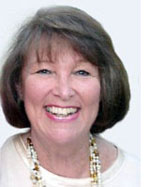 HOLLYWOOD, California— A bright young artist who had previously earned high praise for her work is twitching through her latest exhibition. She is hiding out in a back room of the gallery, where she is having a crisis of confidence, a panic attack, and a nervous breakdown. Simultaneously. HOLLYWOOD, California— A bright young artist who had previously earned high praise for her work is twitching through her latest exhibition. She is hiding out in a back room of the gallery, where she is having a crisis of confidence, a panic attack, and a nervous breakdown. Simultaneously.
In the next scene we find her holed up in a psychiatric hospital, where she has been taken after having attempted suicide by slicing her wrists with an exacto knife---lengthwise along the veins rather than across them. It seems that our heroine, Dana (scrupulously played by CB Spencer), fears that her newest art work doesn’t live up to her earlier promise. “Maybe it was all just hype,” she moans.
Thus begins the Los Angeles premiere of Rebecca Gilman’s haunting comedy The Sweetest Swing in Baseball. An exploration of success, identity, and the nature of insanity, Gilman’s play, like all her work, is intelligent, provocative, and insanely funny.
Dana’s behavior at the hospital is influenced by two new friends: Roy (Jerry Lloyd), an angry sociopath who was convicted of attempting to murder a CNN anchorman whose opinions and attitudes he disagreed with, and Michael (Brian Weir), a gay young addict undergoing rehab for the umpteenth time.
 It is they who inform her that her health insurance will cover only 10 days of hospital treatment---unless she can come up with some major syndrome that requires a longer stay. After reading a biography of baseball star Darryl Strawberry, Dana decides to assume his identity and the symptoms of Multiple Personality Disorder. Though she knows very little about baseball and keeps making goofy gaffes, the doctors allow her to stay. As her condition improves (“being Darryl freed me up,” she exults), she begins to paint again. Only now she is painting baseball scenes populated by chickens in baseball caps. It is they who inform her that her health insurance will cover only 10 days of hospital treatment---unless she can come up with some major syndrome that requires a longer stay. After reading a biography of baseball star Darryl Strawberry, Dana decides to assume his identity and the symptoms of Multiple Personality Disorder. Though she knows very little about baseball and keeps making goofy gaffes, the doctors allow her to stay. As her condition improves (“being Darryl freed me up,” she exults), she begins to paint again. Only now she is painting baseball scenes populated by chickens in baseball caps.
{David Elzer photo}
“There’s no point in trying,” Gary, the grumpy sociopath, tells her. “Everybody’s a wannabe-something,” he says. “The difference between wannabes and losers is that wannabes make things and losers break things.”
 Strangely enough, Dana’s baseball chickens are a huge success and her reputation is revitalized. But not her identity. In the end is she a lost artist or a wannabe baseball player? Strangely enough, Dana’s baseball chickens are a huge success and her reputation is revitalized. But not her identity. In the end is she a lost artist or a wannabe baseball player?
Rebecca Gilman, on the other hand, is not a wannabe nor a loser. Her reputation as an award-winning playwright is well-established and her talent has never been in question. With The Sweetest Swing in Baseball she has delivered another crowd-pleasing hit. The production starts off slowly, leaving you wondering where it’s going, but it picks up the pace in the second act and, while Gilman doesn’t completely knock one out of the ball park, The Sweetest Swing in Baseball has to go into the record books as a solid RBI.
Gilman herself is well-acquainted with the search for identity and acceptance. The daughter of a Jewish man from Boston and a Southern Baptist mother from Alabama, Gilman grew up in a small town near Birmingham, where her father was "just about the only Jew." As she noted in an interview in the New York Times in 2000, "It always felt like we didn't quite fit in. Nobody was overtly mean or anything, but people tended to judge us without knowing about us. They made a lot of assumptions." Identity, assumptions, and misconceptions have been major themes in many of her plays.
The present company for The Sweetest Swing also includes Lilo Greenwald and Ferrell Marshall in multiple parts. They are earnest and believable and well-directed by the excellent Ross Kramer for the West Coast Ensemble, with which he has been associated for the last 15 years. The set design by Stephen Gifford is adequate and serviceable, but Kramer has added a unique touch to the scene changes. The two-man crew who move tables and chairs around to create galleries, hospital rooms, and offices (in this case Brad Cook and Brad Ekstrand) are dressed in appropriate costumes for the scene and incorporate little pieces of business that make them part of the over-all action. That ploy, plus the sound design of Ron Klier, make the many scene changes both speedy and palatable.
The Sweetest Swing in Baseball will be presented Thursdays, Fridays, and Saturdays at 8 p.m. and Sundays at 3 through June 8th at the El Centro Theater, 804 N. El Centro Ave., in Hollywood. So go crazy and Play Ball!
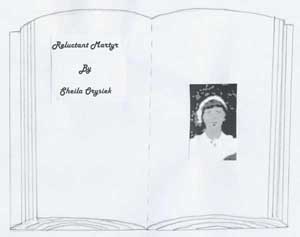 Editor's Note: This is the seventh chapter in our serialization of Reluctant Martyr, a historical novel by our columnist Sheila Orysiek. It is based on the experiences of her aunt. In each Friday-Saturday edition of San Diego Jewish World, we will run another installment of the 21-chapter book until its conclusion. We thank Sheila for granting us first publication rights to her book. Comments are welcome at sdheritage@cox.net Editor's Note: This is the seventh chapter in our serialization of Reluctant Martyr, a historical novel by our columnist Sheila Orysiek. It is based on the experiences of her aunt. In each Friday-Saturday edition of San Diego Jewish World, we will run another installment of the 21-chapter book until its conclusion. We thank Sheila for granting us first publication rights to her book. Comments are welcome at sdheritage@cox.net
Chapters 1 2 3 4 5 6 7 8 9 10 11 12 13 14 15 16 17 18 19 20 21
Reluctant Martyr—Chapter Seven
During the next year the house on State Street slowly filled with furniture, a used over-stuffed sofa and chair given by Aunt Nora were in the parlor. A full size floor model wooden radio stood by the front window. The lamp next to the chair was covered with a fringed shade, and fringes hung in the open archway into the side hall. Hannah had acceded to Jahn’s wishes and quit her work to remain at home. Every day she did the grocery shopping and cared for the house. The iceman and milk wagon stopped daily. The piano had been tuned and repaired and almost every night Jahn filled the house with music.
 They regularly exchanged visits with a circle of friends and a poetry group was formed. After supper, they often spent the evening with friends; they enjoyed playing cards, no money was involved, just sociability. There was a lot of laughter in the house on State Street. They regularly exchanged visits with a circle of friends and a poetry group was formed. After supper, they often spent the evening with friends; they enjoyed playing cards, no money was involved, just sociability. There was a lot of laughter in the house on State Street.
Hannah had seen a beautiful desk and bookcase combination and for their first anniversary they purchased it. It was made of dark wood and stood over six feet tall. Its three bookshelves were behind glass doors that were decorated with intricate latticed wooden scrollwork. Below the shelves a door opened out to make a flat desk table and behind it were tiny drawers and slots. Under the desk door were three drawers. It was the first new piece of furniture they had bought since they were married. A ceramic statue of a lion in full stride crowned the top. The desk was placed in the parlor along a wall all to itself. They had the pleasure of filling the shelves with Plutarch, Shakespeare, original editions of Jack London and volumes of poetry. Significantly all the books were in English.
On the actual eve of their first wedding anniversary, Hannah and Jahn went to the center of the city and had their supper at the automat. Though it was not a romantic setting for a first anniversary, they enjoyed themselves hugely. The automat was interesting in its own peculiar way. Hannah had fun putting coins in the slots and cranking down the handle to watch the food doors pop open. Coffee and hot chocolate, real melted chocolate, poured from the mouths of silver lions heads in the wall. The vanilla ice cream was flecked with vanilla spice and the thick edge cups made for sipping rather than gulping.
After supper they walked on Broad Street to the Academy of Music; the worn facade across the front of the building gave no hint of the beauties within. It was all velvet and brass and modeled on La Scala. The Academy’s patrician box seats were passed on as family heirlooms and tiers of loges and balconies progressed upward to the vault of the ceiling. Delicate columns rose as supports and seemed to have been placed wily nily without regard to the seats and went directly through some of them. Should a ticket holder be unfortunate enough to purchase one of these seats, so be it. The academy stage presented some of the greatest performing artists in the world. Its acoustics enhanced the loveliest voices and the finest musicians to be heard.
Jahn and Hannah, however, did not find themselves amidst the velvet and brass but climbed up ever steeper stairs to the place of the lowest priced tickets. There the floor was bare wood, the seats became coarse wooden benches and knees easily touched chins. It was said, however, that here sat the true music lovers. That night a violinist played and it seemed as if they, from this eyrie, were directly over his flashing fingers. It was a special treat.
Friday night Sabbath suppers were still family affairs that were shared between the two households on Union Street and State Street. Infrequently Yarosh came and even though he always liked to keep a certain distance from the family, on one particular Friday evening he brought Sofia. She was a plain young woman of generous proportions and she was obviously in love with Yarosh.
“Aunt Nora, Uncle Joseph, I would like you to meet Sofia Hantzman,” Yarosh said. He then introduced her to Hannah and Jahn.
“Please, sit down.” Aunt Nora pulled out a chair. “Where are you from, my dear?”
“I was born in West Philadelphia and...”
“Your parents are here too?”
“Yes they are.”
“Funny,” Aunt Nora replied, “I don’t remember people of that name. What does your father do?”
“Aunt Nora!” Yarosh hissed at her. “She....”
“My father has a shoe repair shop,” Sofia answered.
Aunt Nora’s cheeks grew very puffy. “Well, my dear, that explains it! I don’t bother to have my shoes resoled.” Uncle Joseph caught Nora’s eye and she stood up. “Supper is ready, everyone. Let’s eat.”
Within a couple of months Yarosh and Sofia announced their engagement. Though his sister and uncle and their families were, of course, invited to the wedding, Yarosh and his bride made it clear that a distance was to be maintained. They settled down outside the neighborhood in the Strawberry Mansion section of the city.
Yarosh was something of an enigma to the rest of his family. He decided to sell his window cleaning business and to buy a newsstand at the exit of one of the elevated train stops. The profits were good and reliable but the burden was overwhelming, as it had to be manned twenty-four hours a day, every day of the year, and he trusted no one to help him with this tiresome business. Yarosh had always refused to contribute any financial help toward his mother and little sister though he could well afford it. He wrote to his mother informing her of his marriage after the fact. By his twenties Yarosh had turned prematurely gray but in his case it added to his look of prosperity.
Jahn’s bookkeeping business, while not entirely successful, did yield a living. There was money for the rent and food and even an occasional movie or theater outing. His goal was to buy the house they now rented and to this end he saved every extra dollar he could. As their second year of marriage began, Hannah was completing her preparations for citizenship. On the evening before the naturalization ceremony she sat on the sofa in the parlor. Jahn was reading in his chair.
“This is like a dream coming true,” she said.
“What is?” he asked.
“Being a citizen! Just think of all the people who are born here and they don’t have to do anything special to be one.” Hannah became philosophical, “Now I will be part of the history of this country! Why couldn’t other places be like this? Russia is beautiful. Why can’t it be a good place to live? Then people wouldn’t have to run away.”
“The people have to want it to be a good place,” Jahn said, “Maybe someday they’ll want it badly enough.”
When Jahn accompanied her to the courthouse and she swore her oath of allegiance, they were both filled with pride. The rest of the day they walked all about the city enjoying the warm sunshine. They ended up at Rittenhouse Square, one of the many green squares in the center city area. It was surrounded by impressive old buildings, hotels and residences; a place where prosperity lived well. But along side the wealthy residents of the area, were the city’s less fortunate citizens as well as students from the nearby universities and workers on a lunch time break; all shared the shade of the huge trees and enjoyed the green oasis in the city’s midst.
Jahn’s turn for acquiring his citizenship came six months later. It was soon after this that a momentous letter from Sharona arrived announcing her departure date from Cherbourg. All the paperwork was finished; the passage money and tickets were sent.
Uncle Joseph, Hannah and Yarosh went to New York to welcome the newest immigrant members of the family. Almost eight years had passed since Hannah had seen her mother. Theirs had been an exceedingly close relationship which seemed to have been cemented even more closely by this separation. How many times in the past years Hannah had thought, if only my mother were here, if only I could talk to her. Her mother had become even more perfect in her mind. They walked toward one another with outstretched arms.
After the first wonderful greetings, Hannah couldn’t help but notice how much her mother had changed, the years of fear and flight had added to the map of her face. The once chestnut hair was heartily sprinkled with gray and her frail health showed in the stretch of her skin. Beside her was a little nine year old girl. This is my sister, Hannah thought, a stranger. The child was quiet and clung to her mother. She was small for her age and very thin. Her rather pinched little face was surrounded by straight, almost stringy brown hair that needed some brushing.
Hannah had worked, saved and prayed for this moment. As they walked along or stood about, she put her arms around Sharona, but always the child was somehow in between them. Hannah couldn’t help noticing that Sharona’s attention was often captured by the child and Etah used the possessive term “my mother” which Hannah found irritating. She became jealous of this little sister. All during the years of waiting in Romania, Sharona had kept Hannah’s image before Etah’s eyes and never failed to mention the sacrifice her older sister was making to save their lives. The child therefore revered Hannah long before she ever met her. When she first saw Hannah, she thought this older sister was very beautiful. Everything about her seemed wonderful, but being a child she did not see why she should share this mother that had been exclusively her own.
When they arrived back at Hannah’s home on State Street Sharona was very tired. The second bedroom had been emptied of other household objects and readied for their use; she and Etah were to share it. An iron bedstead had been moved in and also a dresser, but there was room for little else. Mother and daughter were to share the bed, too.
As Sharona rested, Etah wandered through the house. She was fascinated with the workings of the indoor plumbing and Hannah heard the sound of water being turned on and off repeatedly. Etah also found the piano and to Hannah’s great displeasure the child irreverently picked at the keys. After that she went into the parlor and inspected the books and peered into all the pockets and drawers of the desk. Hannah was definitely not used to a child about the house and thereafter the desk was kept locked.
When Hannah went upstairs to see her mother, Etah followed. Hannah sat beside the mother’s bed and Etah climbed in. By the time Jahn came home that evening, Hannah was already tired and angered with this little sister. As they all sat around the supper table, Jahn was very quiet. He usually enjoyed coming home and sharing his day and thoughts with Hannah; not so tonight. The child’s voice prattled on, and Hannah was intent on her mother. After finishing his food, Jahn left the table, picked up a book and sat down to read.
The women went upstairs. Sharona had arrived with a suitcase and small trunk and neither had been unpacked as yet. Hannah hung up each item of clothing carefully and though the closet was small, they didn’t have much to put into it. At the bottom of the trunk, wrapped in linen were a dozen pieces of heavy silver tableware and several wine cups; one was a particularly beautiful stemmed cup. Each was heavy, exquisitely made and the silversmith had dated every piece next to his mark. Each date commemorated either a family birthday or anniversary. Sharona had managed through the years of wandering and waiting to preserve these treasures. It was all that remained of the house and household in Russia.
“Mother! I never thought I would ever see this again,” Hannah said, as she lovingly touched each silver piece. “How did you manage to keep them?”
“When I ran from the house - it was already on fire - I grabbed as much as I could. I thought perhaps I might need it for food or to pay someone to hide us. Several times I almost had to do that. But somehow I managed not to.”
“It’s so beautiful...and sad.”
“All those days, it reminds me of, the memories.” But Sharona couldn’t continue to speak as her lips began to tremble.
Aunt Nora gave a welcoming party for these latest arrivals. Afterwards, however, it was home to the house on State Street, where life had changed. Sharona, having been born and married to wealth, had never worked outside the home. There was no prospect of her ever being able to support herself or her youngest child. So, the situation was for the long term.
The newcomers settled into their new home and neighborhood. Etah was enrolled in school and she quickly learned English. Sharona took the classes at the benevolent association to begin her preparation for citizenship. During the day Hannah enjoyed her company and they cared for the house together. Sharona, as her health permitted, took over many of the chores. When they shopped for food she was painfully aware that it was Hannah’s purse that paid the bills. Mother and daughter walked the streets together, Hannah reveling in her mother’s attention. When Etah came home from school, however, this attention was diverted again.
Hannah continued to find it difficult to get used to having a little girl around the house. The natural childish things that Etah did seemed purposefully done to annoy her. Hannah’s fastidious nature recoiled at the sight of a sweater Etah often left hanging over a chair, the child’s hair constantly needed combing, and her dresses were always wrinkled. And, why must she run about so, Hannah wondered? She watched this little sister and pursed her lips in dismay.
The mother was aware of the disruption to the household and so on weekends she took Etah to the park to give Hannah and Jahn a few hours of privacy. Since her health did not allow for much walking, the two of them spent hours sitting on a park bench which was especially difficult for a child.
Sharona was an early riser. She usually awakened with the first light of dawn and got out of bed carefully so as not to awaken Etah. Then putting on her robe she very quietly descended the steep wooden stairs placing each foot carefully so as to soften as much as possible the creaks the old planks gave off as they took her weight. Once down stairs she made herself a cup of tea and then sat in the stuffed chair by the front window and read the Yiddish newspaper. An hour or so later Jahn and Hannah would come down and Hannah would make breakfast for just the two of them and they would sit silently at the table in the dining room. After Jahn left for his work, Hannah would go back upstairs and return to bed. Sharona would then make breakfast for herself and Etah.
On one particular morning as Sharona sat in the chair reading the newspaper, Jahn came into the dining room by himself and looked rather confusedly around at the stove along the back wall. He shook the empty tea kettle disconsolately and began hunting in a drawer for the tin containing tea. “Jahn,” Sharona said quietly, “where is Hannah?”
“She is not well,” he replied, “she has a headache.”
Sharona got up and went into the dining room. “Let me make you something to eat. Sit down.”
“No. No, I will be fine if I can find the tea.”
“Sit down. I’ll make you breakfast,” Sharona repeated. Jahn was happy to sit down and soon he was enjoying a well made meal. Etah came down stairs and she, too, ate. After they both left for school and work, Sharona went upstairs and knocked softly at Hannah’s door. She found the room dark, the cloth window shades drawn. She drew a chair beside the bed and stroked Hannah’s forehead. “I’ll get you some ice,” she said.
Sharona went back down stairs and took the ice pick and began to chip off bits of ice from the block in the ice box. She filled a cloth ice bag and screwed on the cap. She returned to Hannah’s room and resumed her seat beside her daughter’s bed. As the ice bag was placed on Hannah’s head she groaned with pain and murmured how awful she felt. Sharona spent much of the day by Hannah’s bedside. When Etah came home from school she was shooed down stairs and told to be quiet; Hannah had discovered a way to have her mother to herself. And, from then on Hannah left all the cooking for Sharona.
Meanwhile the country around them seemed to be prospering wildly, at least on paper. The ordinary people of that neighborhood knew very little about economics, except the wages they earned and the bills they paid. They had not much knowledge of stocks or stock markets. How could events and decisions taken in offices and board rooms affect them? So, when the stock market crashed it seemed very far away. They didn’t own stocks and most likely didn’t know anyone who did. The storm that was gathering, however, was of a different kind than they had fought before. There were no marching troops, no state sanctioned killings, no clandestine crossings of rivers to escape. But, they would be hurt nonetheless.

ADVENTURES IN SAN DIEGO JEWISH HISTORY
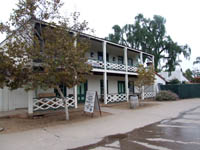
Robinson-Rose House
|
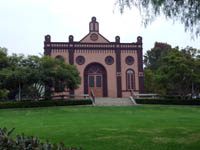
Old Temple Beth Israel |
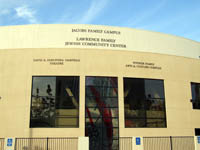
Lawrence Family JCC |
Editor's Note: We are reprinting news articles that the Southwestern Jewish Press ran in 1950. If you have historical topics about the San Diego Jewish community you would like us to explore, please e-mail your suggestions to editor Don Harrison at sdheritage@cox.net
Beth Jacob Forms New Sisterhood
From Southwestern Jewish Press, May 26, 1950, page 4
With the advent of a new building which will house the Synagogue and center for Beth Jacob, a new group within the structure of Beth Jacob is being organized.
A group of some fourteen ladies met at the home of Mrs. Morrie S. Kraus recently to outline plans for an affair to acquaint the community with this new organization.
Mrs. Morton Thaler, temporary chairman, assisted by Mesdames Julius Penn; Robert Strauss; Robert Penn; Morrie S. Kraus; Yale Kahn; William Penn; Ben Ornstein; A.A. Abramson; Arthur Gordon; Jack Prager; Aubrey Shulkind; Sidney O. Weiss; Alwin J. Feiler, who were the nucleus attending the first meeting, have planned a Tea and Fashion Show to be held on Thursday, June 1, 1950, at the San Diego Women’s Club, Third and Maple Avenues. The time is from 1:30 to 4:00 p.m.
Chairman for the Tea to which all ladies in the community are invited, is Mrs. Morrie Kraus, and her co-chairman is Mrs. Robert Strauss. In addition to the above named committee assisting will be Mesdames Morris Wax; Martin Borenstein; Saul Robbins; Sol Winston; and Julius Kahn.
In addition to the Fashion Show which is being presented by Hafters, the principal speaker will be Mrs. A.P. Nasati.
The committee has asked the wife of the spiritual leader of Beth Jacob, Mrs.Baruch Stern; Mrs. Anna Shelley, president of the Ladies Auxiliary; and the wives of the presidents of the Congregation’s affiliates, Mrs. A.A. Abramson, Congregation president; Mrs. J.H. Lipitt, P.T.A. president; and Mrs. Arthur Gordon, Men’s Club president, to pour.
Charter membership in the New Sisterhood will be open until June 30 and all ladies are cordially invited to become Charter members.
It is the earnest desire of the committee to enlist the aid of every Jewish woman of the San Diego community in this project which will benefit each member. Beth Jacob Congregation, and the community as well. Yearly dues are $2.00.
Reservations for the Tea and Fashion Show are being taken by Ruth Robbins at T. 1-6106; Gertrude Thaler at T-1-3275 and Sylvia Shulkind at M-3714.
Histadrut Council of San Diego
From Southwestern Jewish Press, May 26, 1950, page 5
For the benefit of those who probably missed reading an important article in the local newspaper, it is important to note the recent visit to San Diego and Tiajuana of Hugo Ernst of Cincinnati, president of the A.F.L. Hotel and Restaurant Employees International Union who has just returned to this country after touring Israel.
He reported that the labor movement in Israel was the most progressive force in developing the economy f the Near East and that Histadrut, the general federation of Jewish Labor in Israel was vigorous and militant and while modeled after the labour-management structure in the U.S. was participant in all leading enterprises and he cooperatives. He further stated that “it is very important that we in America support the liberal Israeli government so that there would be no danger of reverting to the Arabian medieval cast system whose grip the labor movement had sought to eradicate from the near east.
That Mr. Ernst’s tour of Israel has been impressive is without question for the California locals of his union have pledged $1100,000 to Histadrut to build houses for immigrants of which the two San Diego locals have a $4,000 quota.
Non-Jewish labor officials can do a valuable job of public relations for the State of Israel and should be greatly encouraged to make these first-hand observations by visiting Israel in ever increasing numbers.
Religious Schools Close Year’s Activity With Joint Picnic
From Southwestern Jewish Press, Mary 26, 1950, page 8
The Sunday Religious Schools of Temple Beth Israel, Tifereth Israel and Beth Jacob Synagogues, will close this year’s activities with a Community Picnic on Sunday, June 4th, at Balboa Park.
Every student who has attened one of these schools is cordially invited to come with their parents and friends.
Members of the P.T.A. groups and teaching staffs are planning organized games and contests for all age groups. Prizes will be awarded to winners of the contests. Free ice cream and pop will also be given to each child. The picnic will begin at 10:00 a.m. on the Sixth street side of Balboa Park, north of Laurel Street.
Please watch for further information in the mail from your Temple or Synagogue.
Remember the date—Sunday, June 4th, for a day of games and fun.
S.D. Is Asked To Guarantee Thirty Additional D.P. Families Under Extended Bill
From Southwestern Jewish Press, May 26, 1950, page 10
San Diego has been asked to give 30 more community assurances for the D.P. families so that they can enter this country, local Émigré Committee of the united Jewish Fund officials revealed this week.
In a letter to Victor Schulman, president of the United Jewish Fund and Dr. Walter Ornstein, chairman of the Émigré Committee, Walter H. Bieringer, president of the United Service for New Americans, declared that extra community assurances for San Diego, as well as others from all over the country, are needed because of the recent extension of the D.P. Bill, which now makes 20,000 more Jewish eligible for entry into this country.
This will be the final commitment that will be asked of Americans, Bieringer declared, since the last group of 20,000 immigrants will wind up the flow of refugees to this country.

SAN DIEGO JEWISH WORLD THE WEEK IN REVIEW
Shoshana Bryen in Washington, D.C.: King Abdullah points out Rice's folly
Donald H. Harrison in San Diego: SDJA students, faculty join worldwide quest to be largest group singing at the same time
Rabbi Dow Marmur in Toronto, Canada: Oh, Canada: Do you honestly think that Jerusalem is not a real part of Israel?
Sheila Orysiek in San Diego: The day that Israel became a nation
Cheryl Rattner-Price in La Jolla, California: JCC features work of 8 women artists
Hal Wingard in San Diego: His song, "Noah"
San Diego Jewish World staff in San Diego: Jay Winheld, CPA and Jewish volunteer, dies at 71.
Adventures in San Diego Jewish History: What was the Jewish community news in 1950? Who were the newsmakers? Our archives answer these questions in daily installments
Judy Lash Balint in Jerusalem: The anticipation of Yom Hazikaron
Donald H. Harrison in San Diego: San Diegans and Israelis join in their grief for the casualties of war and of terror
Evelyn Kooperman in San Diego: San Diego Jewish Trivia: Authors
Cantor Kathy Robbins in Cardiff-by-the-Sea, California: Im Tirtzu: Hold Fast to Dreams
Adventures in San Diego Jewish History: What was the Jewish community news in 1950? Who were the newsmakers? Our archives answer these questions in daily installments
Donald H. Harrison in San Diego: Marketing Middle East peace through the products offered in Western supermarkets
Dov Burt Levy in Salem, Massachusetts: Comfort for the bereaved on Yom Hazikaron and year round: the gift of active memory
J. Zel Lurie in Delray Beach, Florida: Let us look at Israel‘s Declaration of Independence as its 60th birthday nears
Joel Moskowitz in La Jolla, California: A dybbuk that teaches righteousness
Adventures in San Diego Jewish History: What was the Jewish community news in 1950? Who were the newsmakers? Our archives answer these questions in daily installments
Cynthia Citron in Los Angeles: From Door to Door is a Dor v' Dor story
Donald H. Harrison in San Diego: There are no cushions in the Duvdevan
Sheila Orysiek in San Diego: What kind of dance accompanied Song of the Sea? We have some interesting clues
Ira Sharkansky in Jerusalem: Independence Week brings its tensions
Dorothea Shefer-Vanson in Jerusalem: Orphaned art looking for owners
Adventures in San Diego Jewish History: What was the Jewish community news in 1950? Archives of the Southwestern Jewish Press provide some of it.
Donald H. Harrison in San Diego: Terror survivors hosted at Beth Am
Rabbi Baruch Lederman in San Diego: When it's not as plain as the writing
Dov Burt Levy in Salem, Massachusetts: 'Smitten Zionist' tells of Israel love affair
Rabbi Leonard Rosenthal in San Diego: 'Can you love your neighbor as yourself?'
Gary Rotto in San Diego: After several toe-dips, Block takes the dive
Adventures in San Diego Jewish History: What was the Jewish community news in 1950? Archives of the Southwestern Jewish Press provide some of it.
< BACK TO TOP
|
|
